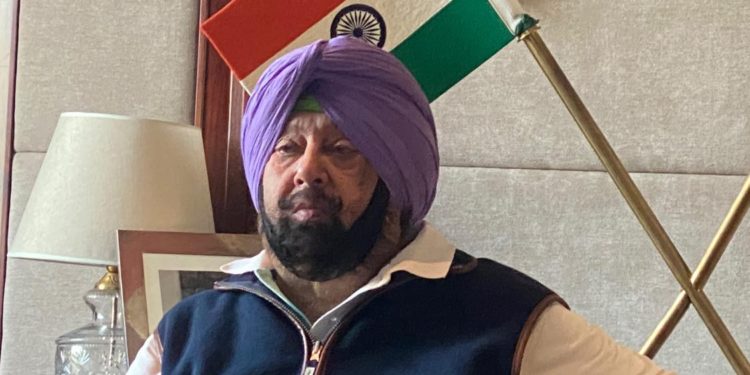ORDERS STRICT COMPLIANCE & SUPERVISION BY SENIOR OFFICERS TO IMPROVE QUALITY OF INVESTIGATIONS & CONVICTION RATE IN HEINOUS CRIMES
Chandigarh, December 19:
To enforce strict investigation compliance and to improve the conviction rate in criminal cases, especially heinous crimes and crimes against women, children and other weaker sections, Punjab Chief Minister Captain Amarinder Singh on Saturday ordered specific targets to be set for investigation of criminal cases by police officers across ranks.
With this, all police officers, from the rank of CPs and SPs down to SHOs, SIs and HCs, will now be required to personally investigate and present challans in a set number of cases in a year, with strict level of supervision by the senior officers. Regular follow-ups, as well as close coordination with prosecution and law officers, has also been made mandatory as per the Chief Minister’s directives, which are aimed at ensuring strict compliance with no laxity.
As per the directives issued by DGP Dinkar Gupta on the orders of the Chief Minister, who is also in charge of the Home portfolio, ADCPs in the three Police Commissionerates and SPs posted in the districts shall personally investigate at least 6 heinous crime cases in a year and submit challans under their own name, while ACP/ DSP Sub-Divisions have been tasked with personally investigating atleast 8 heinous crime cases in a year and submit challans under their own name.
SPs/DSPs of PBI and Investigation/Detective shall personally investigate at least 18 crime cases in a year, including those of heinous IPC crime, commercial quantity NDPS cases etc, and submit challans under their own name, with all similarly mandated to investigate and submit challans in at least 6 heinous crime cases in a year. The targets also cover SHOs of over 400 police stations, who shall investigate at least 8 heinous crime cases and file challans in a year.
The Chief Minister said he had been constrained to set these targets after observing that investigation and prosecution of cases, which should be the key job of all police officers, has taken a back seat due to commitment to Law & Order duties, work pressures and lack of supervision by the gazetted police officers who are responsible for enforcing accountability of the Investigating Officers of various ranks.
Thus, to enforce accountability, Supervisory Officers (SPs/SDPOs and DSPs) have now been directed to personally involve themselves with the investigations of all serious and sensitive crimes and enter Supervision Notes in the crime files, write running crime notebook and issue written directions essential for improving the quality to investigations, while CP/SSPs have been asked to ensure that all the SOs posted in the districts also comply with the directions as per the targets set for investigation by various officers.
The situation was particularly worrying in heinous crime cases, such as murder, attempt to murder, armed robbery/dacoity, Rape, Kidnapping, extortion, POCSO Act, NDPS Act cases of commercial quantity, UAPA Act, IT Act, and other sensation cases involving crimes against women, children and weaker sections of society or crimes having inter-state ramifications. Even in such cases, the Chief Minister said he noticed that the SOs are not being guided and directed by senior officers in carrying out and following up the investigations in an efficient and effective manner. Further, it had also been noticed that SHOs and SIs posted in Police Stations do not personally investigate heinous crime cases and often mark these cases to lower subordinates, in gross violation of the provisions of the law.
The latest directives require that in Special Reported (SR) cases, especially murder, rape, atrocities against weaker sections of society, women and children, and other sensitive and sensational cases, the ACP / DSP Sub-Divisions and officers of PBI shall camp at the scene of crime till the case is solved. They shall guide the SHOs during the investigation process through clear and lucid supervisory notes given in the Case file.
As far as investigations by NGOs and Head Constables (HCs) are concerned, the DGP, in line with the Chief Minister’s orders, has directed that directly recruited Sub Inspectors shall investigate at least 8 heinous crime cases, 10 Minor IPC cases and 10 Local & Special Law cases in a period of one year. Promoted Sub Inspectors and Assistant Sub Inspectors posted in Police Stations shall investigate at least 6 heinous crime cases, 10 other IPC cases and 15 Local and Special Law cases in a period of one year, while regular HCs shall investigate at least 5 Minor IPC cases and 10 Local & Special Law cases in a year.
All these officers shall be responsible for developing leads and carrying out all investigation related tasks, including organizing raids, search, seizure, investigation, preparing of challan and monitoring-pairvi of trials.
The investigations of all Special Reported cases shall be meticulously perused and coordinated by SOs with Prosecution Officers for proper trial management. The SOs shall also coordinate with the Prosecution/Law Officers for ensuring the attendance and proper deposition by witnesses in important and sensitive cases, to ensure cancellation of bail, obtaining police remand and securing conviction of the accused in such case.
The DGP has further directed that IGP/DIG Ranges, CPs and SSPs shall ensure meticulous compliance of these directions and send a Compliance Report, along with the list of heinous crime cases being investigated by SOs, SHOs and directly recruited SIs to DBoI Punjab, by 5th January, 2021.
IGP/DIG Ranges will be responsible for holding Monthly Crime Meetings while the CPs and SSPs will hold Weekly Crime Meetings. Apart from other issues, IGP/DIG Ranges and CPs and SSPs will review the compliance with the above directions regarding investigation of cases during such meetings.
Apart from the field hierarchy, the above instructions would also be complied with by all the Wings, including the BoI/Cyber Crime, STF, CI (SSOC), NRI, GRP.
Gupta said the Chief Minister had earlier notified the Punjab Bureau of Investigation (PBI) and sanctioned over 125 posts of SPs and DSPs for the detection of heinous crimes. Another 800 posts of domain experts, in the fields of law, forensics, commerce, IT and cybercrimes had been sanctioned to support complex investigations.








